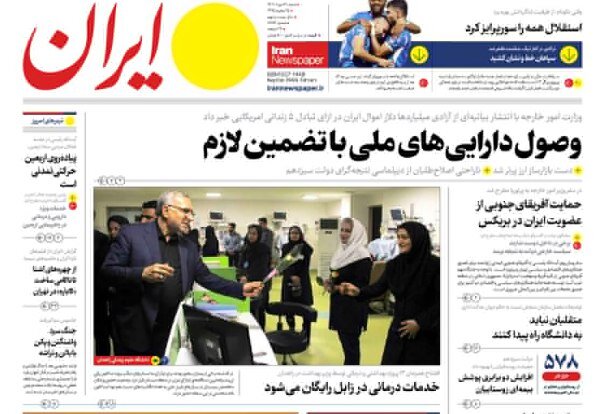Separating negotiations from JCPOA

In a note, the Iran newspaper discussed the imminent release of six billion dollars of Iranian assets in South Korea in exchange for the release of some American prisoners and said: This breakthrough was the first result of the indirect negotiations between Tehran and Washington to untie the knot of stalled talks for lifting negotiations.
With the suspension of Robert Malley, who was a proponent of negotiations within the framework of the JCPOA, the Islamic Republic launched an initiative that for the first time the two sides crafted a step-by-step negotiation framework to pursue Iran's main demands, especially on the issue of guarantees. Due to this initiative, the Biden administration was forced to accept as the first step to unfreeze billions of dollars of Iranian assets in exchange for the release of a number of American prisoners and it entered the implementation phase. Following the publication of the news, the American political scene has witnessed a wide wave of reactions from politicians who strongly attacked Joe Biden and believed that Iran had received a big concession. In a reaction, Mike Pence said: "While I welcome the release of 5 Americans, the American people should know that President Biden has paid Tehran the largest ransom in American history."
Kayhan: Importance of Iran's possible membership in BRICS
In an analysis, Kayhan addressed the importance of Iran's possible membership in BRICS and said: the constructive approach of the 13th government (sitting Raisi administration) at the global stage, especially with non-Western economic and political powers, has facilitated the path to joint new global economic and political alliances. Joining the BRICS group can help Iran lessen the “oppressive strategy” of the West in its maximum pressure on Iran for its nuclear program. In addition, according to most experts in international relations and international political economy, as the American hegemony is being weakened and the non-Western world is on the rise, joining such blocs will help our country to find golden opportunities in terms of economic and political cooperation with other countries. A membership of Iran as the most important power in West Asia, which collectively has the largest oil and gas reserves, coupled with its geopolitical position, including its maritime and transit routes, can open new paths for economic cooperation.
Vatan-e-Emrooz: Anger over Iran-US compromise on prisoner swap, release of funds
In a commentary, Vatan-e-Emrooz addressed the anger over an agreement between Iran and the Biden administration over the exchange of prisoners and release of the frozen Iranian assets in South Korea. It wrote: Tehran-Washington agreement to release the Iranian frozen assets has angered those opposed to Iran. The root of this anger lies in the fact that a significant amount that is going to be released from the frozen assets of the Iranian people is a part of the wealth of the Iranian people that had become a source of income for anti-Iran individuals and groups. Therefore, with the release and return of a part of Iran's property, the theft by the “riot movement” will lessen to a significant extent, and this issue has caused their anger. It should also be pointed out that the recent agreement between Iran and the United States, in the runup to the anniversary of the "Woman, Life, Freedom" riots, has undermined the hopes of the opposition movement from its main supporter, and it shows that the project of isolating Iran, which was followed by anti-Iranian groups, has failed.
Siasat-e-Rooz: Zionists’ struggle to create division between Tehran and Riyadh
As Tehran and Riyadh are seeking to develop relations amid the intensifying U.S. naval movements in the Persian Gulf in a Hollywood manner under the pretext of supporting allies, Israeli Foreign Minister Eli Cohen has talked about Tel Aviv's struggle to normalize relations with Saudi Arabia, Siasat-e-Rooz said in a commentary.
The newspaper pointed to Cohen’s Tuesday remarks in which he said if the United States were to agree to a defense pact with Riyadh as part of a potential normalization deal between Saudi Arabia and Israel, it would reassure Arab nations on the southern shores of the Persian Gulf that they are protected from what he called “Iranian aggression” and rendering their nuclear ambitions “unnecessary.”
The leaders of the Zionist regime, who have been isolated due to changes in the regional developments have tried over the last few months to pretend that normalization with Arab nations, particularly Saudi Arabia, is being pursued. With his current insidious statements, Cohen tried to bring the reconciliation between Iran and Saudi Arabia into a deadlock by raising claims on behalf of Saudi Arabia against Iran in order to divide Riyadh and Tehran. These moves are taking place while Tehran is developing relations with Arab countries. For example, the ambassador of the Islamic Republic in Australia has met with his Egyptian counterpart to discuss bilateral issues.
